Last Friday March 3rd, Newmanbrain participated in the event “AI Applied to the Hospital Management” in which different companies shared innovative projects related to the healthcare industry.
Andrés Pedreño, Torre Juana OST’s founder, where the event was holded, presented the latest innovations in the industry, focusing on the impact that Chat GPT could have in this particular industry. For example, he shared how he consulted Chat GPT/Bing on certain medical symptoms, and the surprising results: Even though, sometimes the responses weren’t not exactly correct, mostly the results were acceptable, considering the information sources it has. Pedreño explains how, the power of this tools in science-related questions, could benefit from training with scientific information published in respected scientific magazines.
He also explains the main challenge of IA applied to the healthcare industry: data. As he put it, “in Spain is easier to donate an organ than your own medical records”, and this is an issue for IA, because “Data is the gas of IA”.

Newmanbrain: IA applied to cognitive assessment

Pablo Belmonte, Newmanbrain’s Co-Founder and CEO alongside with doctor Joaquín Ibáñez (co-founder and CSO), presented THEIA, a fNIRS technology devise that helps the diagnosis of cognitive disorders such as ADHD and MCI with an accessible price, so the mass screening is possible. Its advanced software is capable of depicting real time visualizations and performing AI advanced analytics to provide an unbiased cognitive assessment that can change the way patients are diagnosed.
The algorithm and artificial intelligence are based on computational biology to compare the data of a specific patient with the system’s database. This generates as a result a report that includes a probability of having a specific cognitive disorder. Pablo Belmonte presented both the software and the hardware to the attendants, to show how easy and intuitive it is to use.
As doctor Ibáñez explains, the main difference between THEIA and other neuropsychological tests, is the ability to monitorize patients during time, perceiving very subtle changes that nowadays there’s no way of identifying. Also, another important aspect of THEIA is its price. In doctor Ibáñez words “The true value is in being able to put in everyone’s reach an innovating technology that helps make cognitive diagnosis. If an inaccessible technology is put on the market, it loses all sense of meaning.”
1million bot: Improving medical attention worldwide

Raquel Pomares Urbán, 1MillionBot‘s Linguist Area Coordinator, shared some of the projects that the company has carried out in the healthcare field. Among them is the chatbot Carina, focused on Covid-19 and used in more than 300 public institutions, as well as other projects carried out for the United Nations.
They also presented the project “Mentor” a social platform designed for senior citizens with the goal of improving their social interaction with peers and with technology.
TABEM: AI, automatization of healthcare management

Juan Celdrán Alenda, Co-Founder of Trabem, presented an intelligent software for the management and growth of clinics. Celdrán highlighted the quantitative impact on clinic results as a consequence of the implementation of a flexible and easy appointment system with a permanent 24-hour/365-day service.
This event has shown the importance of Spanish companies evolving in the AI industry, and how startups can create a positive impact in the healthcare industry.
